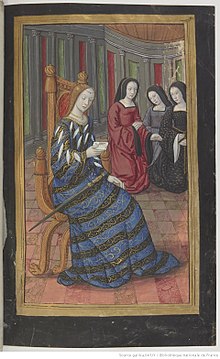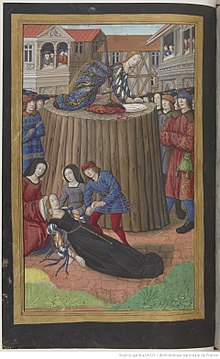
In Greek mythology, Canace ( /ˈkænəˌsiː/ ; Ancient Greek : Κανάκη, romanized: Kanákē, lit. 'barking') was a Thessalian princess as daughter of King Aeolus of Aeolia and Enarete, daughter of Deimachus. [1] She was sometimes referred to as Aeolis. [2]

In Greek mythology, Canace ( /ˈkænəˌsiː/ ; Ancient Greek : Κανάκη, romanized: Kanákē, lit. 'barking') was a Thessalian princess as daughter of King Aeolus of Aeolia and Enarete, daughter of Deimachus. [1] She was sometimes referred to as Aeolis. [2]
Canace was the sister of Athamas, Cretheus, Deioneus, Magnes, Perieres, Salmoneus, Sisyphus, Alcyone, Calyce, Peisidice, Perimede [3] Arne and possibly Tanagra. [4] As the lover of Poseidon, she was the mother of Aloeus, Epopeus, Hopleus, Nireus and Triopas. [5]
In another, more famous version Canace was a lover not of Poseidon, but of her own brother Macareus. This tradition made them children of a different Aeolus, the lord of the winds (or the Tyrrhenian king), [6] and his wife Amphithea. Canace fell in love with Macareus and committed incest with him, which resulted in her getting pregnant. Macareus promised to marry Canace but never did. When their child was born, Canace's nurse tried to take the baby out of the palace in a basket, pretending to be carrying a sacrificial offering, but the baby cried out and revealed itself. Aeolus was outraged and compelled Canace to commit suicide as punishment, sending her a sword with which she was to stab herself. He also exposed the newborn child to its death. This story was told by Latin poet Ovid in the Heroides , a selection of eighteen story-poems that pretend to be letters from mythological women to their lovers and ex-lovers. [7] The story is also briefly referred to by Hyginus [8] and retold by Pseudo-Plutarch, in whose account Macareus kills himself over the matter as well. [9] It was also the subject of Euripides's lost play Aeolus, on which the extant versions appear to be based.
Canace's story was also put to the stage in the verse tragedy Canace (1588), by Italian playwright Sperone Speroni, as well as being the subject of a tale in Gower's Confessio Amantis . She also gave her name to the heroine of Geoffrey Chaucer's Squire's Tale .

In Greek mythology, Macar or Macareus or Macareas, is the name of several individuals:
In Greek mythology, Oebalus, also spelled Oibalus or Oibalius, was a king of Sparta.
In Greek mythology, Triopas or Triops was the name of several characters whose relations are unclear.

In Greek mythology, Nisos or Nisus was a King of Megara.
In Greek mythology, Deioneus or Deion is a name attributed to the following individuals:
In Greek mythology, Iphimedeia or Iphimede (Ἰφιμέδη) was a Thessalian princess. She was attested in Homer's Odyssey in the Catalogue of women as being a mortal.
Polyxo is the name of several figures in Greek mythology:
In Greek mythology, Calyce or Calycia is the name of several characters.
In Greek mythology, the name Leucon may refer to:
Macareus or Macar was, in Greek mythology, the son of Aeolus, though sources disagree as to which bearer of this name was his father: it could either be Aeolus the lord of the winds, or Aeolus the king of Tyrrhenia. His mother was, at least in the latter case, Amphithea.
In Greek mythology, the name Clymene or Klymene may refer to:

In Greek mythology, Erysichthon, also anglicised as Erisichthon, was a king of Thessaly. He was sometimes called Aethon.

In Greek mythology, Aeolus or Aiolos was the son of Hellen, the ruler of Aeolia, and the eponym of the Aeolians, one of the four main tribes of the Greeks. According to the mythographer Apollodorus, Aeolus was the father of seven sons: Cretheus, Sisyphus, Athamas, Salmoneus, Deion, Magnes, Perieres, and five daughters: Canace, Alcyone, Pisidice, Calyce, and Perimede. He was said to have killed his daughter Canace because she had committed incest with her brother Macareus. This Aeolus was sometimes confused with the Aeolus who was the ruler of the winds.

In Greek mythology, Aeolus, the son of Hippotes, was the ruler of the winds encountered by Odysseus in Homer's Odyssey. Aeolus was the king of the island of Aeolia, where he lived with his wife and six sons and six daughters. To ensure safe passage home for Odysseus and his men, Aeolus gave Odysseus a bag containing all the winds, except the gentle west wind. But when almost home, Odysseus' men, thinking the bag contained treasure, opened it and they were all driven by the winds back to Aeolia. Believing that Odysseus must evidently be hated by the gods, Aeolus sent him away without further help. This Aeolus was also sometimes confused with the Aeolus who was the son of Hellen and the eponym of one of the four major Ancient Greek tribes, the Aeolians.
In Greek mythology, Hopleus was the name of the following figures:
In Greek mythology, Phorbas or Phorbaceus was a Thessalian prince and hero of the island of Rhodes. He was sometimes confounded with the Phlegyan Phorbas.

In Greek mythology, Aethra or Aithra was a Troezenian princess and the daughter of King Pittheus.
Agenor was the name of the following Greek mythological characters:
In Greek mythology, Amphissa or simply, Issa was the daughter of Macareus and a lover of Apollo. She was the eponym of the city Amphissa in Ozolian Locris, where her memory was perpetuated by a splendid monument.
In Greek mythology, Hiscilla was a Phthian princess as daughter of King Myrmidon and possibly Peisidice, thus sister of Antiphus, Actor, Dioplethes, Eupolemeia and probably Erysichthon who was otherwise known as her son by Triopas. By the latter, she also became the mother of Phorbas and Iphimedeia.